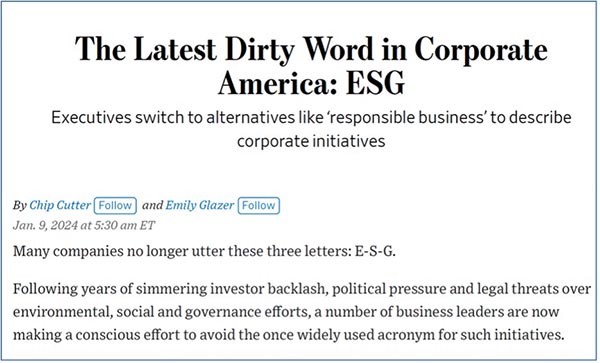In the January 9, 2024, Wall Street Journal, there was an article positing that environmental, social, and corporate governance (ESG) has been removed from the priority list of publicly traded companies, with mentions of the word ESG falling by two-thirds since 2021. After years of investment in ESG, it is certainly not dead. It is however apparently become an unmentionable from an investor perspective since few of the financial promises from ESG initiatives have improved shareholders bottom lines.

Wall Street Journal, January 9, 2024
The nuance in all of this is that sustainability has become more important than ever to the legal and financial viability of companies, mainly driven by regulatory mandates that are now starting to take effect. The chief catalyst in all of this is the 2024 European Corporate Sustainability Reporting Directive (CSRD), which after years of crafting by the EU in Brussels took effect as of January 1. Like many government initiatives crafted by many chefs, the CSRD appears to IT Strategies as a work-in-progress. For the print industry, it is an advance warning that it better prepare to be able to positively respond to these mandates, lest it get caught in the inability to control its own narrative about the importance and value of print as the sustainability regulations become more focused.
The purpose behind this first round of European legislation is to be able to identify and understand what is contributing to business sustainability (or lack thereof). The intent is for the information to help investors, civil society organizations, consumers, and other stakeholders to evaluate the sustainability performance of companies, as part of the European green deal. CSRD will require any European company with over €40 million in revenue (and any non-European company doing business in Europe with more than €150 million in annual revenue) to start quantifying and measuring their sustainability performance.
The objective is to be able to measure where relevant pollution from solvents, energy use, water waste, etc., are coming from—all things that apply as equally to the print industry as it does to other industries. Since it is quite complicated to comply, a whole new industry of specialist consultants—ranging from the big four accounting firms of Deloitte, EY, KPMG, and PwC to divisions of IBM, SAP, and many other boutique specialists—are arising to help companies comply with measuring and reporting this sustainability information in their 2025 filings.
There will be lots of unintended consequences as we as a global society go forth on the journey to become more sustainable. We need to address both the front and the back ends of sustainability. All of these changes give the print industry an opportunity to re-invent itself, to voluntarily get ahead of communicating the value of print and perhaps change the business models before changes are forced upon it.










Discussion
Join the discussion Sign In or Become a Member, doing so is simple and free